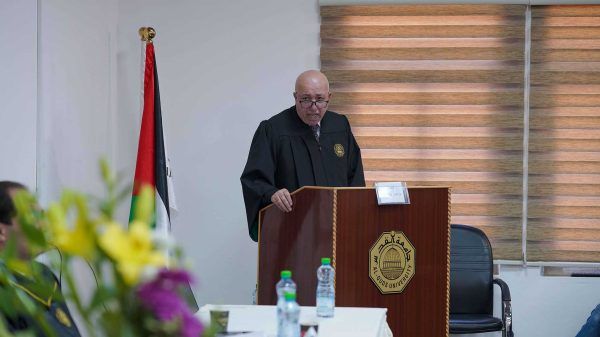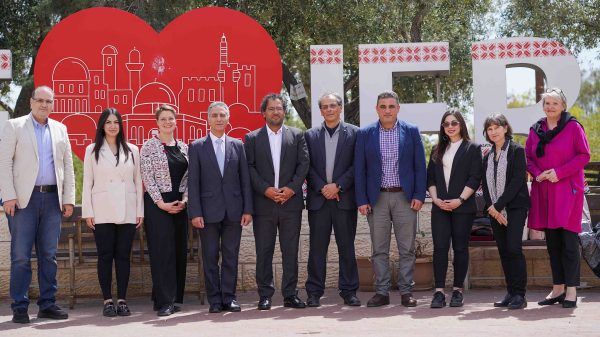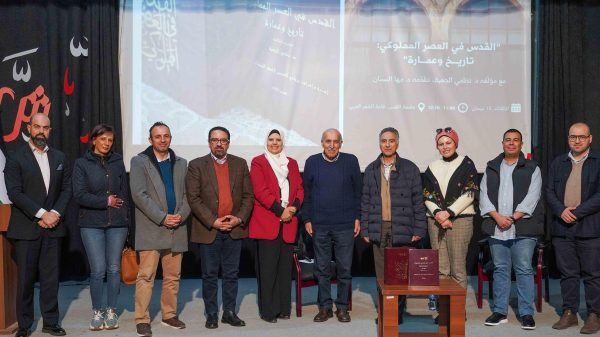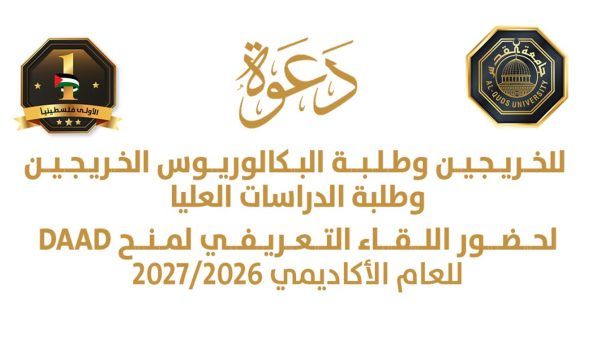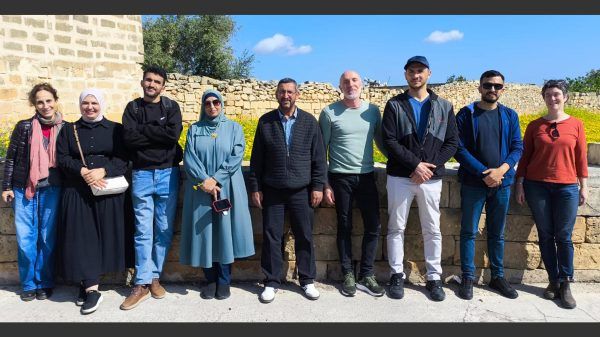
أ.د. سري نسيبه ، رئيس الجامعة يلقي كلمته في دار البلدية في برلين الاسبوع الماضي، بمناسبة استلامه لجائزة الناشر الالماني سيجفريد انسلد للعام 2010.
وكانت دار النشر قد قررت تقسيم الجائزة لهذا العام على كاتبين فلسطيني و اسرائيلي هما
أ.د سري نسيبه عن كتابه (حكاية وطن) واموس عوز عن كتابه (قصة حب و ظلام).

The full text of Nusseibeh's speech on the Occasion of Receiving the Siegfried Unseld Prize , Berlin 28th September 2010
My gratitude for the honor I am being bestowed upon today extends far and wide, not least to my partner in this prize, Amos, who gracefully insisted, having been identified as its rightful recipient, on sharing it with me; as well as to Anthony, whose writing and imaginative skills stand behind making Once Upon A Country such a success. But no gratitude I think can exceed that which I owe my life-partner, Lucy, without whom I could not have become what I am in a very specific way, and it is, first and foremost, what I am, or that I am that way- so I have been given to understand by the Prize committee- which made me qualify to share this very prestigious honor today.
Being who, or what one is has always been a source of mystery to me. One particular offshoot of this mystery, one which has kept nagging at me, constantly upsetting my peace of mind, especially as someone whose entire life has been engulfed in what often seems like senseless conflict, is why, from a logical point of view, I or anyone should fight or fight back for anything, whatever the cause, even if this were the preservation of one's own life, let alone if it were posited as being a piece of territory or a rock or a tribal identity. Surely, as David Hume made famous through his remark that there is no reason why he should not prefer the destruction of the whole world to the scratching of his finger, besides that prejudice Hume refers to which one has for oneself, no obvious or immediate answer to such a question – the question, that is, why one should fight, or fight back- can be found in the realm of independent reason at all.
This indeed is a depressing thought- that, in the end, all that one has to show for oneself is that one just is oneself. But besides that, if this thought is true, it must come as quite a shock to some, for we often believe, immersed in the different kinds of narcissism each of us nurtures for ourselves, that our narratives of our personal or tribal worths have little or nothing to do with our petty prejudices, but must reflect some absolute or transcendental truths, in such a way that our lives, ideas and quarrels down here, however wasteful they might seem, are a mere mirror or reflection of a grander Platonic reality -one that both explains and justifies the logically inexplicable and unjustifiable. The "being Jewish", or "Muslim", as identities -we may come to believe- are of a transcendental nature, their absolute worths and hierarchic order being somehow etched on an eternal divine tablet. Hence we come to believe that we can measure the shedding of human blood or the causing of human pain in those transcendental terms, the difference between Right and Wrong being as clear in this light as the difference between black and white, or between round and square. Military moralists on the Israeli side will weigh with meticulousness to the last individual the number of Palestinian civilians whose lives could be dispensed with for the life of an Israeli soldier, while Palestinians, from an equally high moral ground, but with less attention perhaps to numbers, or to soldier-civilian distinctions, will carry out with equal moral conviction the taking of Israeli life. Such, then, are our naïve narcissistic beliefs about ourselves, whereas, truth be told, and once transcendental terms are invoked, nothing sets Jewish blood apart from Arab blood, or vice versa, and Arabs might as well be Jews in some other world, or the contrary, their this-world identities really being as discardable, or dispensable, as masks at a Vanity ball.
Of course, a little bit of prejudice, whether for oneself or for one's tribe, not only can be innocuous, but it can also be charming. But it is an unfortunate custom we seem to have as human beings that we sometimes tend to wear our tribal identities, not only as coquettish but harmless ball costumes, but almost like irremovable masks -like in one of Jim Carrey's early films by that name- and to subject ourselves, while we wear them, to the mischief and evil those masks seem to compel us to doing, as if against our better judgments, or better natures. Once our evil is done for the day, then we take our masks off, reverting to our roles as apparently civilized men and women, but really designing our lives and life-structures on the basis of what evil we managed to commit meantime against our fellow human beings. It may not need pointing out that this reality of ruthless politics often goes disguised as the respectable international doctrine of the balance of power, or the doctrine, less euphemistically, of might is right.
My moral disparagement of tribal war and contestations over bounties of different kinds and sizes should not be understood as harboring a latent quietism -that to suffer misfortune with serenity is what I believe to be the only rationally defensible doctrine. Quite the contrary, I am a strong believer in activism, or in acting as the way of being. But such activism, I believe -this belief now being upheld by a tinge of Kantian rationalism- must first and foremost be on behalf of universal human values rather than tribal prejudices. If I stand up for Palestinian rights, then I can only allow myself to do so, and only to the extent, on rational grounds, that I can consider my upholding of such rights to be an instantiation of my upholding of universal human rights. My fighting or activism in this case would then be rationally defensible, but only insofar as it has been made so by virtue of this universal moral principle. Absenting this beacon immediately makes reason vanish, reducing the reasoning for what I do to that special regard I have for my little finger. David Hume, casting his look beyond his little finger, opted for those more refined human sentiments in his search for what might replace reason as his guide for moral action. Closer to this part of the world, on the other hand, Kant saw in humanity itself reason for the right kind of action.
Ladies and Gentlemen,
With everyone's eyes set on the latest round of negotiations, and with foreign journalists busily scanning Palestinian territory on a particular date for signs of renewed settlement activity as for a mysterious portent of things to come, there must be millions of questions on everyone's minds. What has in recent years become the conventional model for peace, namely, the two-state solution, or a two-state solution, is now up for the test. Let us hope it passes this test -though with a House fractured on the Palestinian side, a narrow-minded Government on the Israeli side, and a pathetically feeble international role, prospects for such a success seem dim. Other voices have recently been heard calling for seeking other paths for a solution. Again, though, existing political parameters being as has just been described, it is hard to see how commonly agreed progress along such paths can be made. In a way, Israel has fallen victim to its own power, forcing it to be alone at this juncture in being able to identify and to seek solutions for its predicament. Most likely, it will seek half-way measures, necessarily therefore with "half-way" Palestinian representation or leadership, with the hope that somehow, sometime in the more distant future, this "containment" of the problem will somehow make it, or help it disappear. On the Palestinian side, on the other hand, it is the power of their rhetoric that Palestinians have traditionally fallen victims to. Sadly, much noise is still being heard on this front, but there is little or no light. Under such circumstances, it seems what we have to expect and will all have to prepare ourselves for are, not only the long-term and final results of creeping convergences of population masses and the collapsing of urban spaces -making geographic partition of whatever description an outdated currency from the past; but also the pressing predicament of a binary moral system, where jailers and prisoners are confined to the same diminishing space, each side becoming more a victim of its mischievous tribal mask by the day.
I do not wish to say that the angel of peace has therefore departed, or is about to leave us forever. But I think that our challenge as peace-seekers, as human beings, is being made far more daunting than it has been. This requires us to be patient, for sure; but more than ever, it also requires us to have faith in ourselves, in the magic within us, that however impossible things may look, we can still make them happen. They may not happen the exact way we now think they should happen. But how they may happen may turn out to be even better.




